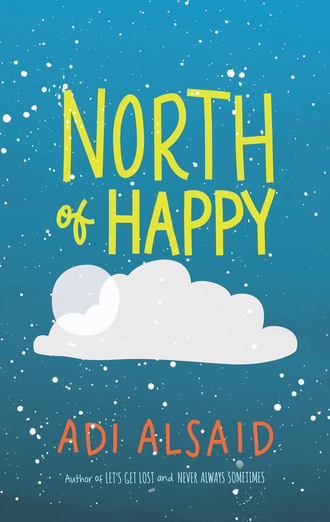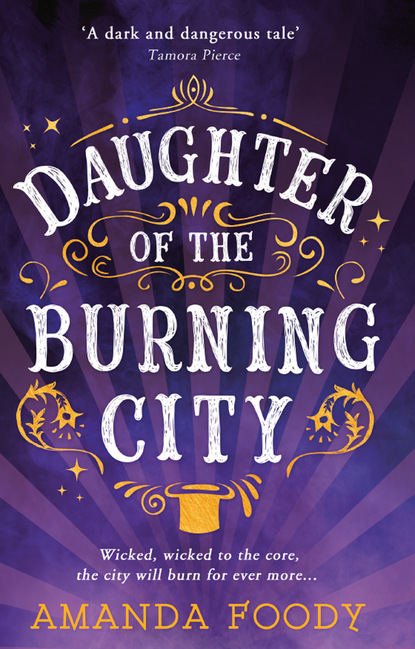
Полная версия
North Of Happy
“Since what?”
She gets that cartoonishly concerned look she sometimes gets, all eyebrows. The purple scarf she’s wearing catches the breeze, unraveling itself. It looks like it’s trying to escape. “I don’t think you talk about your brother enough,” Isa says.
The pigeon tilts its head.
“I know we were never together, but we spent enough time together that I should have heard his name a few times, maybe some stories about him.” Isa uncurls the wayward scarf from her neck and holds it in her hand. I wish I could uncurl myself from this conversation. “I understand why it might not be with me,” Isa says, her hand going up so casually to her eye that I almost miss that she’s on the verge of tears. “But I hope you do talk about him with someone. Just, you know...for yourself.”
“I do,” I lie.
We look out at the city a little longer, elbows brushing against each other. I’ve always loved the expanse of the city at night, its lack of a typical skyline, its refusal to be contained to one stretch of buildings.
Then she exhales and steps away from the railing. “Okay, time for me to take advantage of your parents’ partying. Any food I absolutely have to try?”
I think for a sec, happy to have the conversation turn to food. Food, I can always talk about. “The Thai bruschetta is pretty amazing.”
As soon as she steps away, the pigeon flits over to me. “She’s cute.”
I don’t respond.
He ruffles his feathers, picks at something in his wing. “Look at these people, man,” Felix says, unperturbed by how I’m ignoring him. If he were still a person, I could picture him crossing his hands behind his head and leaning back. Maybe he’d click his tongue a few times in disapproval.
He’s looking with his little pigeon head in the direction of the bar, where Dad and a few of the other parents are standing in a circle, holding drinks. Next to them a group of my classmates do the exact same thing. The adults sip their tequila and the kids shoot it. Add a few gray hairs, adjust their tastes so that they’re from the seventies or whatever and it’s basically a mirror image.
“You’ll forget about cooking,” Felix says, loud enough that for a moment I worry someone will hear him. “You keep going down this road, that’s where you’ll end up. Just like them.” He bobs his head in Dad’s direction. Dad, who’s holding a shot of tequila, and looking like he’s about to shoot it. Dad, who went to the same school as me and Felix, got a nice safe business degree—Dad, who was irate when Felix refused to follow that same path.
Dad, who hasn’t even talked about Felix in months.
Felix coos and flaps his wings. If he just left me alone for a moment, it might be easier to pretend like I have my shit together.
Then Dad smiles and heads toward the DJ stand. He motions for a microphone, gestures impatiently as the DJ cuts the music and hits a few switches. His shirt is unbuttoned way farther down than any middle-aged man’s shirt should be. I think he’s swaying a little. Sometimes I can’t stand looking at him.
“Shit,” Felix the pigeon says. “He still loves his fucking speeches.”
“Bienvenidos,” Dad says through the speakers. He looks around for a drink, and then snaps his fingers at a passing waiter and asks for another shot of tequila. He thanks everyone for coming, cracks a joke about how this isn’t a party for my graduation but a party for him not having to pay for tuition anymore. The crowd responds with alcohol-boosted laughter.
“He made the same joke when I graduated,” the pigeon grumbles. Then he offers one last coo and takes off, disappearing unceremoniously into the night. For a second I feel relief. Maybe he’ll stay gone.
“Hijo, I want you to look forward now,” Dad goes on. “Forget about the past, about what we’ve lost.” He pauses and looks down at the floor for a moment. He bites his lip, like he’s struggling to keep back tears. “I know you miss your brother, and I miss him every day too. Life isn’t fair.”
The performance is impressive, but it makes me want to throw something at the stage. Dad basically wiped his hands clean of Felix long ago, and not even death has undone the forgetting. To him, Felix has been dead for years. Only for appearances will he pretend to be broken. He wants all these people to just go quiet for a moment or two, to think that he’s trying to move past tragedy, instead of completely unaffected by it, like I know he is. It’s what I see every day: Dad talking about work, Dad talking about my future, Dad going on like nothing’s happened.
Then, after all these months, something within me clicks. An understanding. Felix has it right. Escape. Yeah, I know it’s probably not a great sign that I’m thinking a pigeon is my dead brother, and I know that everything I heard Felix say was maybe not real, just my grief doing strange things to my head.
But he had that part right all along. I shouldn’t be here.
As Dad keeps up the charade, talking about my future and my prospects while he’s got a son in the grave, I step away from the edge of the party, cut through the crowd. Most people probably think I’m going to grab myself another drink. They don’t see my hands shaking at my sides; they haven’t noticed that my shadow disappeared when Felix did, that I’m not whole anymore. No one tries to stop me. Maybe they don’t even see me.
It’s only when I exit that I hear the murmurs start to build, and Dad’s speech get derailed.
I smile the whole elevator ride down.
CHAPTER 2
MEDITERRANEAN OMELET
3 eggs
2 tablespoons butter
2 tablespoons sundried tomatoes
2 tablespoons fresh basil
1 tablespoon goat cheese
Sea salt, to taste
METHOD:
When I get home, I don’t know where I’m going, but I know I’m leaving.
Mom and Dad are probably on their way home too, but they’ll have to make a few explanations, give some instructions to the caterers or whatever. I have some time, but as soon as I’m in my room, I pull the suitcase from the top shelf in the closet, toss it open onto my bed. Out of habit, or maybe to distract myself from what I’m doing, I turn on the TV.
A commercial pops up: Tupperware, and then cars, cleaning products. I throw all my underwear into the suitcase, along with some socks, two pairs of jeans. I’m actually doing this? On the screen, out of the corner of my eye, I recognize the show. It’s called Today’s Specials. They profile different restaurants across the world, spend an episode with each one.
The show starts with a female chef in the kitchen at dawn, a single burner lit. The camera pans to a quiet morning in the San Juan Islands off the coast of Washington State, golden sunrise over the water, a hummingbird gorging on sugary water from a feeder. “How this is cheap real estate is beyond me,” the female chef says on voice-over. They show the name of the restaurant: Provecho. Then the name of the executive chef and owner: Elise St. Croix. Something feels familiar about that, so I keep watching.
A shot of what she’s making: perfectly golden omelet. Sundried tomatoes, fresh-picked basil, goat cheese. I want to step through the screen and watch her every move, so I can make it for myself. Felix and I have been watching this show for years, drooling on the couch and then scurrying to the kitchen as soon as the credits roll so we can try to recreate the dishes.
Since he died I haven’t been able to watch the show at all. Especially when he shows up on the couch next to me and begs me to change the channel to it, or hijacks whatever it is I’m watching by putting himself in the screen.
They cut away, show the thirty-table restaurant. Chef Elise sits at one of the six patio tables and eats calmly, looking out at the scenery. She’s in her late forties, light brown hair in a ponytail. The green of the surrounding islands pops on the screen, the morning ferry from Seattle discernible in the distance. They probably booked the restaurant solid for a month on the strength of that one image.
Then, my favorite part of the show. The kitchen comes alive. Knives coming down like they’re machine-driven, flames licking at liquids in saucepans like they’re trying to get a taste. The kitchen jargon that sounds like an exotic language. Onions are diced in seconds, herbs chopped and thrown into small plastic containers. A cook cracks a joke, and another one looks up from the meat he’s butchering, laughing without even stopping his work.
The staff gathers around as Chef goes over the menu, like soldiers at the ready. Her white chef coat is spotless, a tasting spoon tucked into that tiny pocket in the upper sleeve. She speaks like a general in peacetime, calm but commanding. The guests arrive. Attractive servers bring out black leather menus, smiling widely, the day’s specials on the tips of their tongues. Cooks begin poaching shrimp, flipping steaks with tongs.
I’m holding a stack of T-shirts in my hands, transfixed. Then I remember Felix’s stack of notebooks.
He kept track of every day of his travels and would send me each filled-out journal for safekeeping. I drag my nightstand over so I can reach the top of my closet, where I’ve been storing them in a cardboard box. I think I know why this restaurant feels familiar to me.
The notebooks are mostly in Spanish, the rare English word marked by stray accents, as if Felix wanted to bend it to his preferred tongue. It takes all my effort not to thumb through each notebook, to not get lost in Felix’s adventures. He never bothered to date them, but I always marked down what day I received them. I know the entry I’m looking for, can recall the words as if I was there too. It was about a year ago, when Felix was in Israel. He’d saved a bunch of money while living on a kibbutz for a while and had treated himself to a nice meal, at a fancy restaurant called Mul Yam.
I usually believe the best meals are to be found in home kitchens, Felix wrote. This time, I was wrong. Below, he’d listed restaurants he wanted to eat at in his lifetime. A few of them had been crossed out with blue or black or red ink. I don’t allow myself to think of all the ones he didn’t get to, but my suspicion was right. At the top of the list is Provecho.
The show comes back on. I’ve been watching scenes like these so often the last couple of years. Chef Elise walks down rows of planted herbs and vegetables, rallies her troops, the kitchen comes alive, mise en place, the guests arrive, twinkling lights on the patio.
It might be a simple coincidence. There are constantly reruns of this show, and there’s a good chance Felix watched this same episode years ago. But it feels like so much of a sign that I look for Felix in the screen, some acknowledgment that this is his doing.
I pull my rain jacket from the closet, though I don’t really know what the hell the weather will be like, just that the island is near Seattle and Seattle is rainy. I fold the jacket neatly on top of the other clothes. My heart is pounding.
I’ve never acted impulsively in my life. Felix got all those genes. It feels like I’m borrowing his disobedience, like I’m stealing something, acting Unlike Myself. But that doesn’t keep me from putting a knee on the suitcase to force it closed.
In my parents’ room, a safe is hidden behind a shoddy fortress of clothes. The combination is easy to remember; every time Mom and Dad are on the same flight, Dad sits me down with a list of instructions on what to do just in case. I grab a few hundred dollars, both my passports, the emergency credit card that’s in my name. I use my cell phone to buy a plane ticket and then call a cab, ignoring the slew of missed notifications on the screen.
My hands are shaking and sweaty. I can’t believe how easy it is to feel like I’m in control.
I use the bathroom before I go. It’s when I’m washing my hands that I hear the awful sound of the front door opening. Mom’s voice rings out first, fraught with worry, “Carlos?” I look at my reflection in the mirror and can almost see the back wall. All my edges are blurred. I take a deep breath, open the door.
Mom looks instantly relieved that I’m home. Dad, not so much. “What happened? Is everything okay?” She gets close, like she’s inspecting me for bodily harm.
“What the hell are you doing?” Dad asks, noticing the suitcase propped up by the door. He shakes his head, and then calmly removes his suit jacket and folds it onto the little table at the entrance. “Before we get into that,” he says, pointing at the luggage, “you’re going to apologize for leaving like you did. That was embarrassing.”
I know that this, at least, is not an unreasonable request. But I can’t find the words to acknowledge it. These talks with Dad always feel like trickery, like everything he says is a trap waiting to snag me.
Mom puts a hand on Dad’s forearm. She tries to whisper something, but he interrupts: “He can speak for himself. Just apologize, Carlos, and then we can talk about whatever it is you think you’re doing.”
I think: I can’t do this anymore. I think: I’m barely even here. I say: “I have to go, Dad.”
The words come out like a whimper. So, I’m not stealing all of Felix’s personality traits, then. Felix never whimpered.
At least the words are out there. I wait an eternal moment for Dad to respond.
Dad sighs and, almost under his breath, says, “Great, another son who doesn’t know how to apologize.” Then, louder, he says, “Fine, I’ll bite. Go where?”
Mom’s already tearing up a little, like she knows exactly where this is heading, like she’s getting déjà vu and knows already how this ends. Dad slams the wall with his open hand, repeats himself: “Where, exactly, are you going, Carlos?”
I stare Dad down, trying not to whimper again. “I have to get away from this. It’s not what I want,” I say. “The internship. Everything.”
Dad leans back against the door, crosses his arms over his chest. “No me digas.” You don’t say.
For a wild moment I consider confessing, telling them about Felix, how I still see him but I feel like I’m the one who’s gone. His death made ghosts of both of us and I just want it to stop. I search for more words but end up looking at the floor.
“So you’re running away,” Dad says. He’s got a bit of a smirk on his face, like this is some argument that can be won. “Just like your brother did.” He full-on smiles now, uncrosses his arms, un-leans from the door, moves out of the way. He picks up his jacket, walks past me and toward the bedrooms. “A lot of good it did him,” he says.
Then the intercom buzzes; the taxi’s here.
“Sorry, Mom,” I say, pulling up the suitcase’s handle and rolling it out the door. I don’t want to acknowledge what Dad just said.
She follows behind, stepping into the elevator with me. I keep my eyes on the floor counter above, watching the numbers light up like a countdown. 15...14...13...
“He’ll cut you off, like he did with Felix,” Mom says. Being American, she’s a little more direct than Dad. “He may not show how much he was upset by your brother leaving, but believe me, he was. You leaving too? It’ll kill him.”
7...6...5...
I can smell her perfume, something floral she’s worn forever.
“Just tell me where you’re going.”
It’s not Mom’s fault, but I can’t bring myself to say anything. I don’t want to lose my nerve.
The doors ding open. Mom doesn’t follow me out, but she holds her hand out and keeps the doors from closing. “I won’t tell your dad. I promise.”
Our doorman comes over, all smiles, to grab my suitcase. I want to just rush to the taxi, but leaving Mom is harder than storming away from Dad. “Just tell me you’re coming back,” she says. There’s a tear in the corner of her eye, just waiting there on the precipice, and it’s what I say next that will determine if it tumbles down the edge.
I look from her to the car, and I know that it’s not too late to stop this and turn around. Tell them what’s going on with me, open myself up to their help. “I just need to do one thing,” I say, finally. “For Felix.”
“One week,” she says. I’m not sure if it’s a plea or a question or a command. The tear, thankfully, doesn’t fall. I might have stayed put if she cried.
I nod and then rush to greet the taxi at the door.
Slam the trunk, slam the door, if only the taxi driver would peel out and leave rubber trails on the asphalt.
I break free.
CHAPTER 3
AIRPLANE SANDWICH
1 pseudo-croissant roll
2 slices highly processed ham
2 slices maybe cheese
1 mustard packet
1 mayo packet
METHOD:
I have a quick layover in LA, then a red-eye to Seattle. The plane is half-empty, and I have a row to myself. But instead of laying out and getting some sleep, I stare out the window. Stars, and the moon reflected on puffy white clouds.
It’s like I can feel every mile that I’m farther away from home, from Dad, from the haunted life that had set itself in stone before me. I try to think about what my parents are going through, what my friends will say, but, with my forehead against the window, it’s hard to think of anything but that restaurant, waiting out there in the dark. The plane hums insistently; the screen in front of me shows a little cartoon depiction of us escaping from Mexico.
By the time we land in Seattle I’m exhausted and it hits me that I don’t know where I’m staying tonight, that I have no concrete plan. I just had this destination and now I’m here. I’ve officially been spontaneous. It makes me feel like Felix.
I’d thought he might get left behind in Mexico with the rest of my family. I thought that was why he kept wanting me to go, to get away from him. So when he shows up at baggage claim, sitting on top of the carousel among the luggage, I’m disappointed that I’m not so easily cured.
I’ll eat once at the restaurant, I think to myself, heart pounding. Eat once, honor Felix’s memory. Maybe spend the whole meal just crying or something. Get it all out. Come back normal, or whole, or as close to whole as possible.
I turn my phone on finally, but I keep it on airplane mode. I’m not ready to hear from anyone in Mexico. As the sun rises, I take a cab to the Seattle piers, where the morning rays light up Puget Sound.
I buy a cup of coffee at a nearby stand, though I don’t even like it. I just know that’s what Felix would be doing. The heat and bitterness feel surprisingly nice, even if I’m wincing at every sip. A few minutes later the ferry boards. The trip is lovely, sun warming my face. I have to fight off sleep so that I don’t miss any of the scenery. White birds fly alongside us, emerald islands all around, the Seattle skyline fading in the distance, swallowed up by the haze of the ocean.
Needle Eye Island is smaller than I’d realized. There are no taxis around, just a slew of people waiting to board the ferry bound back to Seattle. I approach the empty information booth and grab a map of the island, looking up at the greenery and then back down to get a sense of what it all looks like. Fog creeps in from the ocean, filtering the sunlight. What the hell am I doing here?
Provecho is marked on the map as a tourist destination. It seems to be within walking distance, so I set out in the direction of the restaurant. Soon I reach Main Street, a couple of blocks’ worth of quaint old-school America that I’d always thought movies exaggerated, until now.
The restaurant’s façade is simple: a large window facing the street, a black sign with white lettering. It’s on the corner of the block, and I can see the edge of the picket fence that borders the patio.
I finger-comb my hair, wipe away some of the sweat from walking around. A car rolls by slowly, gravel pebbles bouncing behind it and rearranging themselves into the word enjoy, in Felix’s handwriting. I wish he’d stop reminding me he’s around, but I find myself grinning all big and stupid, and I realize I’m excited for the first time in months.
I walk up to the front door, salivating already at the prospect of the meal. But the door is locked, because of course it’s locked. It’s not even eight in the morning yet. The schedule etched on the glass says they don’t open for a few hours. Well, then.
I peer into the door, cupping my hands to remove the glare. There’s no one in there. I step back to my suitcase, look both ways down the street. There’s hardly anyone out here with me. It almost feels like the entire island is abandoned, like I’ve flown directly into isolation. As if to confirm that, I look down at my feet. Still no shadow.
I take the bend around the street, wanting to see the patio I saw on TV just yesterday. The view makes me feel better immediately. Water, green islands, sailboats, puffy cartoon-like white clouds. It’s a dream. I keep staring at the ocean, partially because it’s impossible to look away, partially because I want to stall, give myself time to think of what the hell I’m supposed to do now.
Then I hear a door creak open, and to my left a guy in a chef coat and checkered pants appears. He moves a nearby rock over to keep the door open. His arms are tattooed to the wrist, and he’s pulling a pack of cigarettes from his pocket. He doesn’t notice me right away while he lights his smoke and checks his phone. It almost feels like an apparition, like he walked off the set of a cooking show.
I cough, and then the cook looks up. He’s got bags under his eyes, a couple days’ worth of scruff. Surprisingly young, maybe a year or two older than me, if that. Americans always look older to me, so it’s hard to tell. “Not open,” he says, cigarette in his mouth.
“No, I know.”
The cook eyes me, the suitcase at my side. “Then what the hell do you want from me, dude?” He takes a long drag, and when I don’t say anything he looks back down at his phone, exhaling a puff of smoke that dissipates quickly in the breeze coming in from the water. From the cracked door, I can hear the vague clattering of people moving about the kitchen. I want the smell of Chef Elise’s food to waft out, but all I get is the cigarette.
“Sorry,” I say, feeling like at least one of us is an asshole. I turn around, go back to the front entrance, where I see a girl slip a key into the door and push it open. She’s wearing earphones, a baggy brown sweater, a bag slung over her shoulder. I know this is stupid and weird, but I don’t have anywhere to go and can’t stand the thought of wandering around the island with no place to go and no one to talk to, so I roll my suitcase over to the door. I knock on the glass.
A few seconds later the door swings open. The girl standing in front of me is pretty—late teens, dark hair, large sixties-style glasses—and for a moment I forget what the hell I’m doing here. Then, over her shoulder, I see the restaurant, exactly like it was shot in the TV show. Thirty tables, a mirror along one of the side walls to make the space feel bigger, a bar adjacent to the hostess stand for people waiting. The back wall is floor-to-ceiling windows looking out at the patio and the ensuing view.
“Sorry,” I say, realizing how long it’s been without me saying a word. “I wasn’t staring at you. I know it probably looked like that. I was just...” I point over her shoulder, stammer, feel my mouth start to go dry. “I want to make a reservation?”
The girl chuckles. “You might officially be the earliest person to ever show up for a reservation.” She holds the door open to let me in and then heads to her hostess stand. “What’s with the suitcase?”
“Um. I just got here,” I say.
“That’s cool. From where?” She opens up a large leather-bound agenda and runs her finger down that page.
“Mexico City.”
She looks up at me over the rims of her glasses, takes me in for a moment. “You came straight from Mexico City to this restaurant before dropping off your bags?”
I fiddle with my luggage tag. “When you put it that way it sounds kind of insane.”
She laughs, eyebrows raised. “No, not insane. Just eager.”





